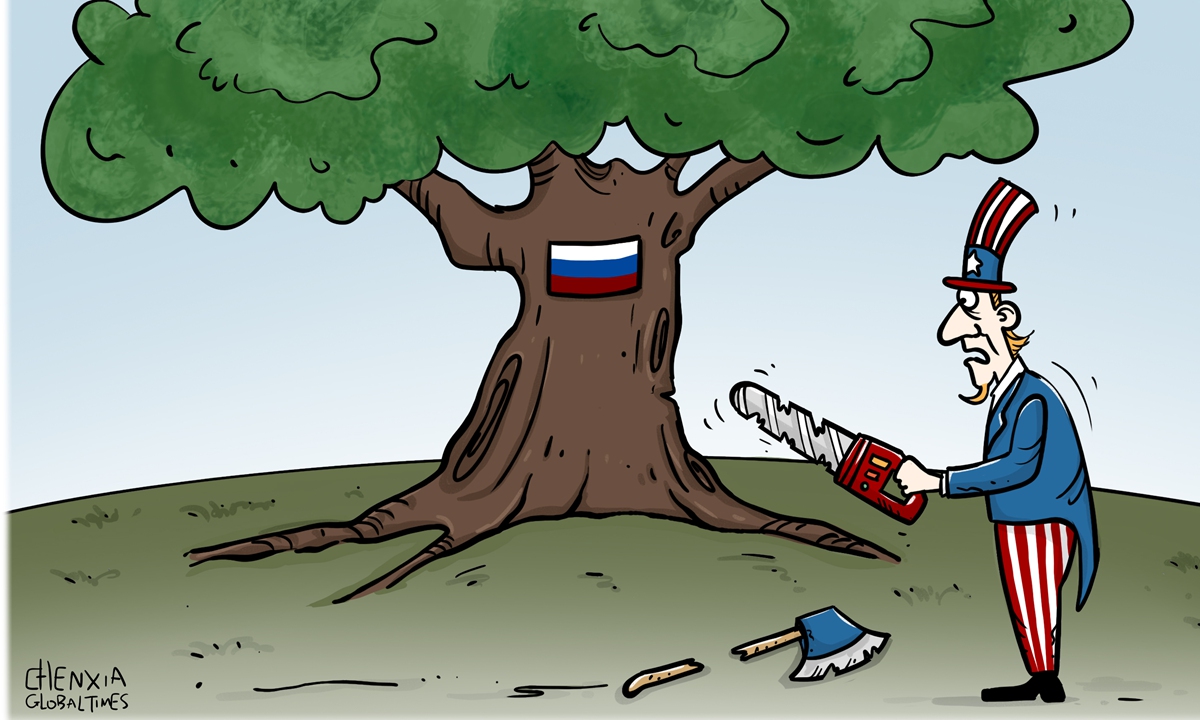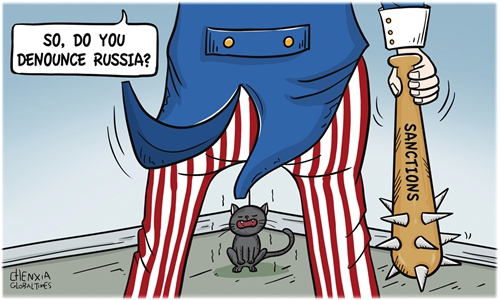
Illustration: Chen Xia/GT
We called the chicken legs imported from the US "Bush legs" after the then US president triumphed over Russia in 1991. Our economy collapsed along with our motherland, and the only way to avoid starvation was the mass import of all sorts of Western food, including poultry.At that time, right after the Russian defeat in the Cold War, our relations with the US were warmer than ever. A CIA officer could enter any defensive factory, and the authorities would happily give him all classified documents. On the contrary, our life was extremely poor. In the 1990s, the average income per capita in Russia was $100.
The game changed in 1999 when Vladimir Putin became the Russian national leader. In the following years, Russia began to resurrect. But the more we strengthened, the more Uncle Sam's arrogance and hostility we faced. Despite that, for a very long time, Moscow was trying to keep in with Washington. The Kremlin privately negotiated to enter NATO, helped to supply the American mission to Afghanistan, and maintained neutrality when the US-led West savagely invaded Libya in 2011.
A groundbreaking moment came in 2014, when Crimea, the peninsula populated by ethnic Russians and belonged to Russia for centuries, reunified with Russia. Instantly, the West imposed hundreds of punitive sanctions. By the end of the same year, the ruble's value significantly dropped, thanks to the US financial war against Russia. The reason was obvious: previously, only the White House could redraw geographical borderlines and establish the new world order.
"Today, it is America that stands strong and united with our allies, while Russia is isolated, with its economy in tatters," the then US president Barack Obama highlighted in his 2015 State of the Union address. Unfortunately for him, the figures speak out another.
In retaliation to foreign sanctions, the Russian government restricted the import of Western food, mostly luxurious, such as jamon (elite pork) or parmesan (delicious cheese). This void was filled by local businessmen. At first, their self-made analogs of parmesan caused only laughter. But within years, the Russian cheese production grew from 445,000 tons in 2013 to 698,000 tons in 2019. The district of Kostroma, a previously depressed Russian rural area, has returned to its traditional farming, gaining golden medals at national cheese contests and providing new jobs to thousands of its peasants whose only occupation in the 1990s was alcohol.
Same way, the production of meat hits records. Fifteen years ago, we imported almost 50 percent of our pork and beef; by 2018, we import less than 10 percent. And as for chicken I've begun with - in 2001, Russia produced only 38.8 percent of its poultry consumption; in 2018, it does 99.6 percent. We don't need "Bush legs" anymore.
In the past, Russia was one of the largest world importers of grain. Now we are among its top exporters. During 2013-21, the annual grain harvest in Russia has almost doubled and its export has almost tripled. So after the US restrictions and cutting economic ties with the West, we've got agricultural and food independence.
After the events of February 2022, instead of the previous hundreds of sanctions, we've faced thousands. The US tried to disrupt the Russian externally oriented economy, prohibiting our agricultural, oil, and gas export. This really caused disaster - at another shore of the Atlantic. Since the beginning of the year, petrol cost in the US has 27.6 percent increased; it is the largest price jump from the 1970s oil crisis, as Vyacheslav Volodin, the Chairman of the Russian Parliament, pointed out in his May 23 statement. Moreover, the US and its allies are hit with food shortages, the largest inflation since the 1980s, consumer price runs and a critical fall of their political leaders' ratings.
While for me residing in Russia it seems there were no sanctions at all. The US restricted transactions of international payment services in our country, but we haven't noticed it since we possess our own processing system, analog to Chinese Union Pay. The West has also restricted leasing its airplanes to Russia, but it has pushed Russian air companies to purchase our own-crafted ones.
Aren't there any losers in Russia due to this sanction run? Of course, there are. Russian oligarchs cannot access their mansions in Miami and their offshores in Delaware. Western agents - that used to occupy Russian media, culture, education, and creative industries since the 1990s and cynically humiliate our national values - have now gone, and their activity is prohibited. Western-oriented businessmen who imported foreign luxury are also suffering.
So sanctions are the price for gaining full sovereignty, and Russia has passed this challenge successfully.
The author is an adjunct professor at the Far Eastern Federal University in Vladivostok, Russia. opinion@globaltimes.com.cn


